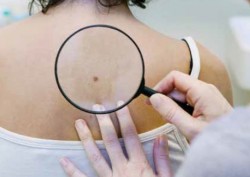Love the Skin You’re In
Skin cancer is on the rise; here’s how to prevent it.
 Q: What is the largest organ in the human body?
Q: What is the largest organ in the human body?
A: The skin.
Since the skin is our largest organ, it makes sense that skin cancer is by far the most common cancer. The good news is that most suspicious moles and skin tags are normal or can be diagnosed as less invasive basal or squamous cell cancers. These cancers can nearly always be removed without further treatment.
However, melanoma demands vigilance. It’s the main reason we need frequent skin checks. When found early and treated, the cure rate is excellent. Allowed to grow, melanoma can spread quickly and even become deadly.
Know your ABCDEs
In 1930, the risk of melanoma was just 1 in 1,500. Now, according to the American Cancer Society, 1 in 38 people are likely to have melanoma in their lifetime. The absolute key to successful treatment is early detection.
It’s skin smart to see a dermatologist frequently for a full body evaluation. In between appointments, especially if you have a family or personal history of skin cancer, check for new growths, or changes in existing moles or marks.
Knowing your ABCDEs means knowing how to spot signs of trouble:
Asymmetry: one half is unlike the other half
Border: a curved, irregular or blurry border
Color: varied areas of color; different shades of tan, brown, black, red, sometimes even blue
Diameter: larger than the diameter of a pencil eraser (usually)
Evolving: changes in shape, color or size
Likewise, see your doctor if your find something:
flaking
bleeding
oozing
itchy
painful
tender
If you see something that catches your eye, looks different or bothers you, see your doctor. Don’t guess! Have it checked!
Know your Skin Smarts
Everyone, regardless of culture or skin tone can get skin cancer (caused most frequently by the sun’s damaging rays) and should take precautions to prevent it. Especially those who work in the sun, burn easily, have light hair or skin and have a family history of skin cancers. A few sun-smart reminders:
Limit sun exposure, especially between 10 a.m. and 4 p.m.
Wear a hat and long sleeves when you are out at mid-day.
Use a Skin Cancer Foundation-approved sunscreen with sun protection factor of at least 15.
Avoid tanning beds entirely.
Protect children. Preventing skin cancer starts early!
